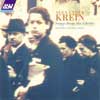Krein Songs from the Ghetto
Intensely personal music, much composed between two world wars, by a minor master who deserves to be better known
View record and artist detailsRecord and Artist Details
Composer or Director: Alexander Krein
Genre:
Chamber
Label: ASV
Magazine Review Date: 11/2003
Media Format: CD or Download
Media Runtime: 70
Mastering:
Stereo
DDD
Catalogue Number: CDDCA1154

Tracks:
| Composition | Artist Credit |
|---|---|
| Elegy |
Alexander Krein, Composer
Adam Summerhayes, Violin Alexander Krein, Composer Jonathan Powell, Piano Joseph Spooner, Cello |
| Jewish Melody |
Alexander Krein, Composer
Alexander Krein, Composer Jonathan Powell, Piano Joseph Spooner, Cello |
| Poème-Quator |
Alexander Krein, Composer
Alexander Krein, Composer Almira String Quartet |
| (2) Hebrew Songs |
Alexander Krein, Composer
Alexander Krein, Composer Jonathan Powell, Piano Loré Lixenberg, Mezzo soprano |
| (5) Preludes |
Alexander Krein, Composer
Alexander Krein, Composer Jonathan Powell, Piano |
| Aria |
Alexander Krein, Composer
Adam Summerhayes, Violin Alexander Krein, Composer Jonathan Powell, Piano |
| Jewish Sketches |
Alexander Krein, Composer
Alexander Krein, Composer Almira String Quartet Elizabeth Drew, Clarinet |
| (3) Songs from the Ghetto |
Alexander Krein, Composer
Alexander Krein, Composer Jonathan Powell, Piano Loré Lixenberg, Mezzo soprano |
Author: Rob Cowan
The cover artwork for this CD is at once both apposite and a little misleading: a sepia-tinted photograph taken of a procession of disorientated Jewish victims, perhaps in the Warsaw Ghetto or somewhere nearby. It’s a tragic image with ‘Songs from the Ghetto’ printed beneath the composer’s name, suggesting genuine ‘Entartete Musik’, possibly by a concentration camp inmate. In fact Alexander Krein was born in central Russia, the son of a klezmer musician and collector of folk music; his brother David was a violinist who committed suicide under pressure from anti-semitism. The deeply elegiac Aria (1927) for violin and piano was dedicated to David’s memory.
Alexander was a decidedly eclectic presence. A heated 19-minute Poème-Quatuor (1909) hints at parallels with Schoenberg’s Verklärte Nacht of some 10 years earlier and certain late Scriabin; Scriabin and Chopin are an even stronger presence in the Five Preludes of 1903-06. Interestingly, elements of the second of the Two Hebrew Songs are heard in the last of the Jewish Sketches for clarinet and string quartet, the raciest music on the disc and an obvious product of the klezmer tradition. Mezzo Loré Lixenberg brings colour, temperament and countless gradations of vibrato to the Songs of the Ghetto (1929) whereas the opening Elegy (1913) is based around a rising melody that mirrors aspects of Glazunov, Fauré and the young Korngold – or seems to.
Krein was a skilful composer with a musical language that more often than not expresses an intense yearning. One word of warning, though: such unrelenting earnestness ideally demands staggered listening, so I wouldn’t attempt to swallow it whole. The performers sound utterly dedicated and the recording is excellent.
Alexander was a decidedly eclectic presence. A heated 19-minute Poème-Quatuor (1909) hints at parallels with Schoenberg’s Verklärte Nacht of some 10 years earlier and certain late Scriabin; Scriabin and Chopin are an even stronger presence in the Five Preludes of 1903-06. Interestingly, elements of the second of the Two Hebrew Songs are heard in the last of the Jewish Sketches for clarinet and string quartet, the raciest music on the disc and an obvious product of the klezmer tradition. Mezzo Loré Lixenberg brings colour, temperament and countless gradations of vibrato to the Songs of the Ghetto (1929) whereas the opening Elegy (1913) is based around a rising melody that mirrors aspects of Glazunov, Fauré and the young Korngold – or seems to.
Krein was a skilful composer with a musical language that more often than not expresses an intense yearning. One word of warning, though: such unrelenting earnestness ideally demands staggered listening, so I wouldn’t attempt to swallow it whole. The performers sound utterly dedicated and the recording is excellent.
Discover the world's largest classical music catalogue with Presto Music.

Gramophone Digital Club
- Digital Edition
- Digital Archive
- Reviews Database
- Full website access
From £8.75 / month
Subscribe
Gramophone Full Club
- Print Edition
- Digital Edition
- Digital Archive
- Reviews Database
- Full website access
From £11.00 / month
Subscribe
If you are a library, university or other organisation that would be interested in an institutional subscription to Gramophone please click here for further information.




